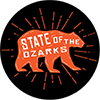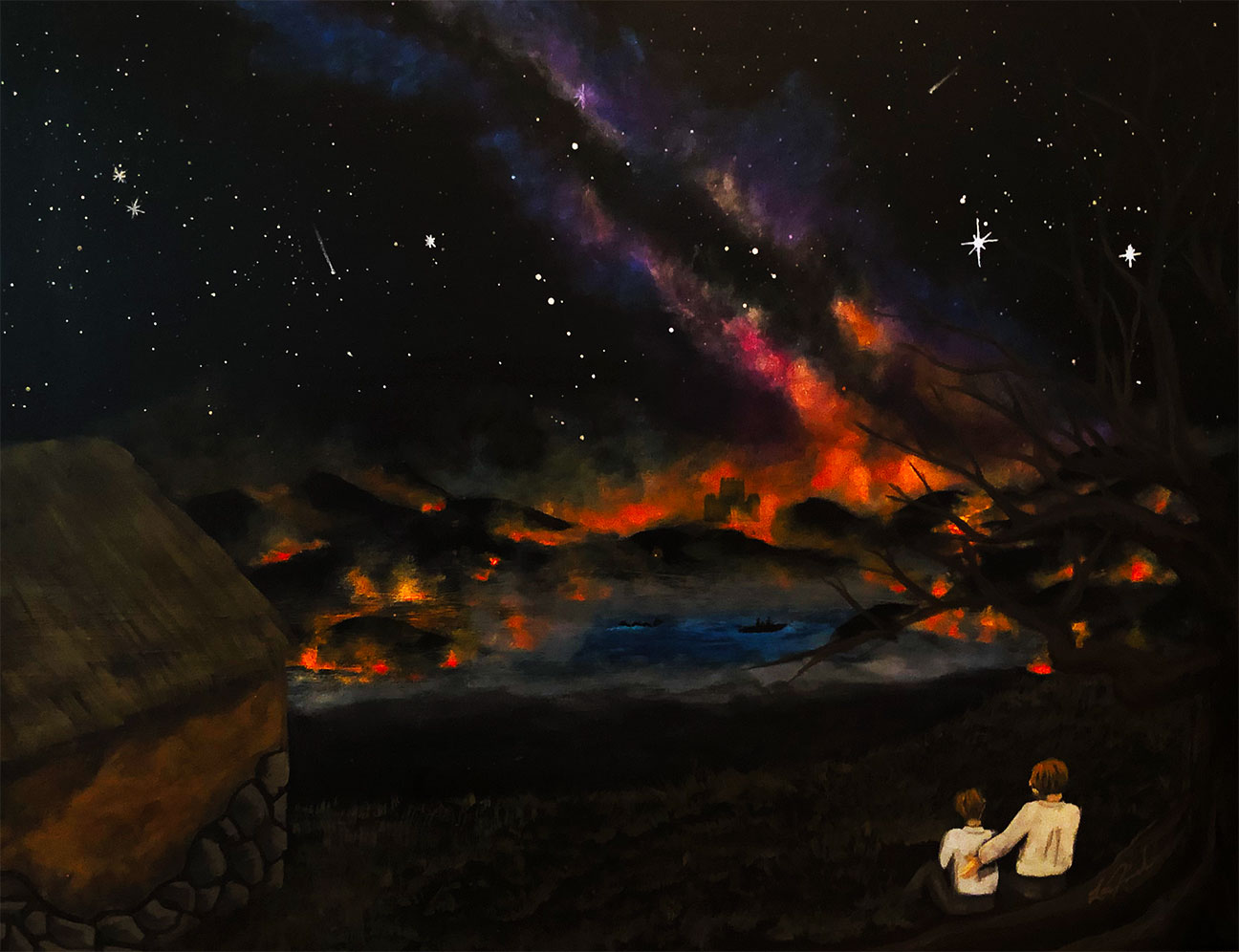Over the Scottish Sea
by Dalton Quick with art by Lacey Finchum
Sometimes I imagine what it would feel like to die.
I find a place on the fields of Glencoe overlooking the Highlands. I sit there, the ground shaking beneath me, smoke rising in the distance, the sounds of guns and cannons firing in the fields over the mountains. I close my eyes and feel the vibrations work through me. I think of all of the pain I’ve felt in my life – the burns, scrapes, blows and falls. I imagine them all coming together in a single instant, the bomb falling, the ground trembling, my body quivering as the pain rips me to shreds. I do this every day, several times over. Because a foolish part of me hopes that maybe, if I get it right, I’ll feel what’s supposed to come after – the kiss of death, the sweet release, the end of it all.
And I’ll finally be free.
Free of the fear.
Free of this war.
The war my father is leaving us for.
The night before his departure, I’m treating the inevitable with silence and watching the stars on a strangely still night, in my usual place on the fields just outside our house. Or, what was once a house. Since the battles started between the Scottish and the British, our village has been decimated, the walls of our house reduced from stone to clay mud that barely packs together, and a straw roof to match.
My dad says that houses fall; homes stand forever. But I wonder if a home can stand when the man who built it is gone.
“Can’ sleep?” His Celtic drawl slips out in every breath. My mum, a proper English woman, says that’s her favorite thing about him. She broke all protocol when she married a man from the warring Kingdom. Whenever I ask her how she could leave her homeland, her family, her every loyalty and sense of being for a man of a different lot, she simply smiles and says: “What we had in common was greater than what separated us.” She means love.
I can’t help wondering if she’d make the same choice, knowing he’s about to leave us. Knowing there’s a good chance he’ll never come back.
“Can I tell ye a story?”
He doesn’t wait for an answer, and I’m not sure I could voice one if I wanted to. Sometimes grief gets caught in your throat. I sit motionless, feeling the grass sway as he sits beside me and runs his hand down my arm.
His hands are warm, comforting, strong… all the things our family will need to survive this war.
I know the beginning before Dad says a word; it’s the way he starts every fairytale. There is no, “Once upon a time.” He says the best stories aren’t found in the past; they’re lived in the moment. “Over the Scottish Sea, there were two Highlander brothers, one aulder, one younger. One day, the brother Adair was readyin’ to go out on Loch Lommond, against his Da’s orders. Ye see, Da’d been tellin’ ‘em stories a the monster livin’ in the waters since they were wee bairns. But Adair craved adventure, and, so, he convinced his brother, Calder, to go along with him.
“Calder was verra brave; didna show his fear a the monster even a lil’, though he was shakin’ in his boots. And Adair was more fearful of disobeyin’ Da then of the monster. So they get their canoe, and they go out on the Loch, where they bide their time waitin’ for the monster to show. And when it doesn’, Adair jumps right inta the water, challengin’ ‘im… and, then, BAM!”
Dad throws his hands together with a clap like gunfire before the dawn of battle; and then he throws his hands on me, reaching under my ribs, tickling me as he makes the noises of what I can only assume are meant to be a monster.
“There he is!”
“Okay! Okay, knack off!” I manage, fighting back his arms and my laughter. “I’m too old for these stories. Too old to be scared by monsters.”
“Will ye le me finish, laddie? Will ye jus’ give me that?” Folding his hands, his eyes wander the distance. “So there’s the monoster – swimmin’ underneath ‘em. And it didna take long for the monster to pull the wee lad under. Now, Calder had a choice to make. He could paddle home, grab his Da, and try to make it back, knowin’ tha his brother migh’ not make it, ye ken. Or he can jump in the water and try helpin’ him himself.”
“But why would the brother who’s scared be any more suited to battle the monster?”
“Because, lad…” He inhales, a satisfaction in his eyes, “he’s the aulder of the two brothers. He’s stronger; he knows battle and weapons. He knows how to win a fight.”
The revelation settles, his lesson as clear as the heavens on a starry night like this.
“Nobody ever truly outgrows fear, me son. Tha’s the point of the tale. Your monster mae not be the serpent of Loch Lommond. It migh’ be a battle yer worried ye’ll lose, a war that tears people apart, an adventure ye migh’ not make it home from, a sickness that threatens to take ye… or it migh’ be sayin’ goodbye.” His eyes meet mine for just a moment, his voice a whisper when he says, “Tha’s my fear… sayin’ goodbye to ye.”
I turn away after that, while he runs his hand through my hair. And though I’ve played up the big man who couldn’t possibly let fear rule him, I feel like a young boy again.
He lips quiver silently as he kisses my shoulder, savoring what might be the last time he sees me. And I let him do it… because my own tears have soaked through my shirt – the goodbye running down my face.
“This world is full of monsters. It’s okay to be scared of ‘em. You should be scared of ‘em. But it’s not okay to run away.
“I love ye.” He places one more kiss on my forehead. “I know that ye know tha’, but I’ll spend every minute of every day sayin’ it to ye even when yer not there to hear it. I’ll be sayin’ it while I’m gone; and I’ll be sayin’ it when I get back.”
If only he can make it that long.
I love you, too. I wish I wasn’t sobbing silently behind my closed lips. Maybe then I could say the words out loud.







